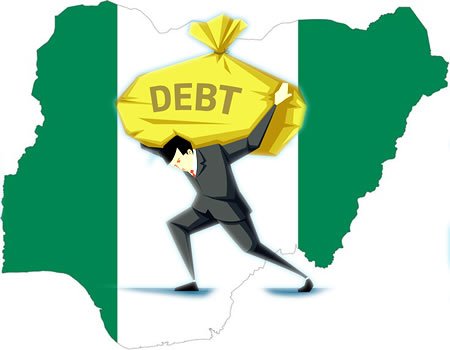The Nigerian government borrowed 6.644 trillion in 2021 and paid debt with 2.93 trillion, according to the Debt Management Office (DMO).
According to Anaedoonline.ng, the office’s Director-General, Patience Oniha, made the announcement at a press conference in Abuja on Thursday.
Nigeria’s overall public debt increased from N32.92 trillion in 2020 to N39.56 trillion, or $95.78 billion, as of December 31, 2021, according to her.
Amaechi Reveals Nigeria Will Turn To Europe For Loan As China Stops Assisting
According to the DMO’s boss, the country’s total debt comprises fresh borrowings by the federal government as well as sub-national governments.
According to Oniha, the money was used to help finance the budget deficit, capital projects, and economic recovery.
“Nigeria’s entire public debt as of December 31, 2021 was N39.56 trillion dollars, or $95.78 billion dollars,” she stated.
The sum represents the Federal Government of Nigeria, 36 state governments, and the federal capital territory’s total external and internal debts.
“The corresponding figure for December 31, 2020 was N32.92 trillion dollars, or $86.39 billion dollars.
New borrowings by the FGN and sub-nationals are included in the public debt stock as of December 31, 2021. It should be remembered that the FGN’s 2021 appropriation and supplementary acts includes a total of N5.49 trillion in fresh borrowings (from domestic and overseas sources) to help fund the deficit.
“It’s Not A Sin To Borrow”– Fashola Backs Buhari’s Excessive Borrowing
“Borrowings for this purpose, as well as disbursements by multilateral and bilateral creditors, account for a large share of the debt stock rise. Increases in the debt stock of the states and the FCT were also noted.”
Despite the debt growth, Oniha stated that the country is still within the World Bank’s and the Economic Community of West African States’ total public debt stock to Gross Domestic Product limits (ECOWAS).
She also stated that the Federal Government was aware of the country’s comparatively high debt-to-revenue ratio, and that Nigerians should not be concerned about the rising debt.
The DMO boss added that the government has established certain measures to increase revenues through the strategic revenue growth initiative and the introduction of Finance Acts since 2019.
She said, “The new borrowings were raised from diverse sources, primarily through the issuances of the Eurobonds, sovereign Sukuk, and the FGN bonds. These capital raisings were utilised to finance capital projects and support economic recovery.
PUBLIC DEBT: Problems We Have With It – ICSAN
“With the total public debt stock to GDP as at December 31, 2021, of 22.47 per cent, the debt-to-GDP ratio still remains within Nigeria’s self-imposed limit of 40 per cent. This ratio is prudent when compared to the 55 per cent limit advised by the World Bank and the International Monetary Fund for countries in Nigeria’s peer group, as well as, the ECOWAS convergence ratio of 70 per cent.”
Follow us on Facebook

